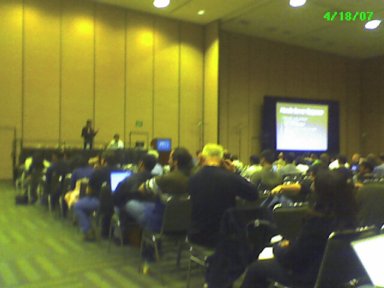Praveen Allavilli and I just finished our talk, "Mashing Up With User-Centric Identity", at Web 2.0 Expo. The final presentation (which differs somewhat from the original version we sent to the conference organizers) is available at http://johnpanzer.com/presos/MashWithIdentity.ppt.
People said it went well; I hope so. We think it's important to deal with 'deputization' and user permissions and I hope we can get a widely accepted OpenID extension to do this as well. In the mean time, our OpenAuth APIs show one way it can be done, and they enable some pretty cool mash-ups.

 In Mountain View.
In Mountain View.
